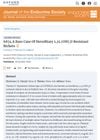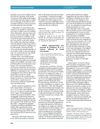Search
for
Sort by
Research
90-120 / 1000+ results
research Case Study: Hereditary Cancer Genetic Testing in Unaffected Patients May Allow for Early Intervention and Aggressive Management
Genetic testing for cancer risk can lead to early and life-saving treatments in people without symptoms.

research A Rare Case of Hereditary 1,25-Dihydroxyvitamin D Resistant Rickets
A rare genetic mutation causes resistance to vitamin D, leading to severe rickets and requiring high doses of calcium and vitamin D for treatment.

research Clinical and Molecular Genetic Studies in Hereditary Hair Loss
Researchers found a genetic link for hereditary hair loss but need more analysis to identify the exact gene.

research Mutations in the Vitamin D Receptor Gene in Four Patients with Hereditary 1,25-Dihydroxyvitamin D-Resistant Rickets
Four patients with a type of rickets and hair loss had different mutations in their vitamin D receptor gene, causing it to not work properly.

research Experience of Intravenous Calcium Treatment and Long-Term Responses to Treatment in a Patient with Hereditary Vitamin D-Resistant Rickets Resulting from a Novel Mutation
Intravenous calcium therapy is a safe and effective treatment for a rare type of rickets.
research Characterization of Human Keratin-Associated Protein 1 Family Members
Mutations in hKAP1 genes may cause hereditary hair disorders.

research Diseases of the Skin: Treatment of Scalp Disorders
The document concludes that scalp disorders can be treated with hair washing, specific shampoos, medications, and sometimes surgery or hair transplants, but hereditary baldness is untreatable.

research Nonfebrile Seizures in Pediatrics: Key Points to Remember
Early diagnosis and treatment of hereditary vitamin D-resistant rickets (HVDRR) are crucial to prevent growth issues and other health problems.

research Hair: More Than Just an Appendage
A boy and his father with hereditary hypotrichosis simplex were treated for hair loss, but the treatment result is unknown.

research Hair Loss (Alopecia or Baldness)
Baldness is often hereditary and linked to male hormones, becoming noticeable when half the hair is lost.

research Gene That Causes Woolly Hair Revealed
Mutations in the P2RY5 gene cause hereditary woolly hair.

research Angioneurotic Edema Without C1 Esterase Inhibitor Abnormality: Efficacy of Tranexamic Acid
Tranexamic acid effectively reduced swelling episodes in a girl with a rare form of hereditary angioneurotic edema.

research Mayo Clinic Office Visit: Female-Pattern Hair Loss Interview with Rochelle Torgerson, M.D., Ph.D.
Dr. Rochelle Torgerson says female-pattern hair loss is often hereditary, starts after puberty, and can be slowed with treatments like Minoxidil. It can also indicate other health issues.

research Androgenetic Alopecia
Androgenetic alopecia (AGA) is a common, hereditary hair loss condition that can be slowed but not permanently reversed with available therapies.

research Comparing Current Therapeutic Modalities of Androgenic Alopecia: A Literature Review of Clinical Trials
Some treatments for hereditary hair loss are effective but vary in results and side effects; new therapies show promise but need more research.

research Androgenetic Alopecia: Etiopathogenic Aspects, Diagnostic Methods, and Therapeutic Approaches
Common baldness is a hereditary condition that can be treated with medications or surgery to prevent progression and improve self-esteem.
research Genetics of Polycystic Ovary Syndrome
PCOS is a hereditary disorder that can lead to diabetes and heart disease if not treated early.

research Role of Caffeine in the Management of Androgenetic Alopecia
Caffeine may help hair growth in hereditary hair loss.

research Potential Application of PBM in Hair Follicle Organoid Culture for the Treatment of Androgenic Alopecia
Light therapy might help treat hereditary hair loss by improving hair follicle growth in lab cultures.

research Androgenetic Alopecia Updates: Pathophysiology, Diagnosis and Treatment
New treatments are being explored to slow or reverse hereditary hair loss.

research Androgenetic Alopecia in Women
Female hair loss is often hereditary and can be treated with medication, hair transplants, and lasers.
research Germline Mutation in ATR in Autosomal-Dominant Oropharyngeal Cancer Syndrome
A specific ATR gene mutation is linked to a hereditary oropharyngeal cancer syndrome.

research Bi-Allelic Mutations in LSS, Encoding Lanosterol Synthase, Cause Autosomal-Recessive Hypotrichosis Simplex
Mutations in the LSS gene cause a rare type of hereditary hair loss.

research Mutation in 5′ Upstream Region of GCHI Gene Causes Familial Dopa-Responsive Dystonia
A specific gene mutation is linked to a hereditary form of dystonia that responds well to certain medications.

research A Nonsense Variant In KRT31 Is Associated With Autosomal-Dominant Monilethrix
A variant in the KRT31 gene causes a rare hereditary hair disorder called monilethrix.

research Toward Optimal Health: The Experts Respond to Hair Loss in Women
Hair loss in women is often due to hereditary conditions or stress, and while treatments like minoxidil can help, diagnosis and management require medical guidance.

research Clinical, Histopathological and Immunological Characteristics of Exfoliative Cutaneous Lupus Erythematosus in 25 German Short-Haired Pointers
A disease causing skin issues in young adult German short-haired pointers is hereditary, with most affected dogs not responding to treatment.

research Eyebrow Reconstruction in Dormant Keratosis Pilaris Atrophicans
Eyebrow reconstruction using hair follicle grafts was successful in a man with a benign hereditary disorder affecting his eyebrows.

research Pearly Pinna Papules in a Young Female
The young woman has a benign, hereditary skin condition with no signs of a more serious syndrome.